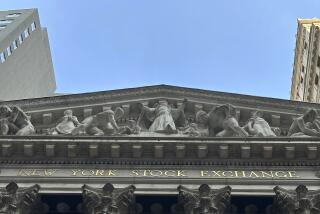Merck’s Shares Sink 27% on Vioxx News
- Share via
Merck & Co.’s surprise decision Thursday to yank its Vioxx arthritis drug off the market socked investors across the country, who for decades considered its shares to be among the safest on Wall Street.
The company lost almost $27 billion in market value -- more than the entire value of Ford Motor Co. -- after Merck disclosed that its blockbuster arthritis drug doubles the risk of a heart attack among patients taking it for 18 months or longer.
Vioxx accounts for about one-tenth of the company’s sales.
Merck shares skidded $12.07, or 26.8%, to $33, their lowest level since 1996. Merck also cut its 2004 profit estimate by 45%, to 60 cents a share.
The Dow Jones industrial average got pulled into the downdraft, falling almost 56 points, or 0.6%. Without Merck’s plunge, the index would have risen 33 points.
“You know there were a lot of people who got hurt by this,” said Jim Paulsen, chief investment strategist at Wells Capital Management. “I can’t remember something that had this big a move in a single day, short of a scandal stock like Enron, in a long time.”
Shaken investors sought guidance on what they should do next.
“I’ve had more e-mails this morning than I ever get,” said Bob Howard, editor of the Positive Patterns investment newsletter in Springfield, Mo. “Most of my clients own Merck.”
According to fund tracker Morningstar Inc., 920 mutual funds own a collective 311 million Merck shares, or 14% of the total shares outstanding. Among U.S. investment clubs, Merck is the 19th most popular holding.
The fund with the biggest percentage holding of Merck shares was ProFund Advisors’ Pharmaceuticals UltraSector fund. The fund, which had 9.8% of its shares in Merck, sank 5.6% on Thursday.
Although Thursday’s drop was precipitous, it followed several years of poor performance for Merck. Its shares tumbled 37% in 2001, 4% in 2002 and 14% last year.
The drug sector as a whole has been hurt by concerns over pending patent expirations and fears that government price caps could be imposed. After falling hard in early 2002, the sector has moved sideways in recent years, largely sitting out last year’s broader market rally.
Merck’s hard fall Thursday was the first time in two years that a Standard & Poor’s 500 company with a market capitalization of at least $10 billion lost more than 25% of its value in a single day, according to data compiled by Bloomberg News.
Since 1999, there have been 41 such drops by S&P; 500 companies in a single day. Apple Computer Inc., for example, lost $7 billion in market value when its shares fell 51.9% after a profit warning on Sept. 29, 2000.
Raytheon Co. dived 43.6% on Oct. 12, 1999, also on a profit warning. And Halliburton Co. sank 42.4% when an unfavorable asbestos verdict was returned Dec. 7, 2001.
The news was not entirely sour for Merck investors. The company said it didn’t plan to cut its dividend. At $1.52 a share, the annual dividend yields 4.6% based on the stock’s closing price Thursday -- trumping the 4.12% yield of a 10-year Treasury note.
* (BEGIN TEXT OF INFOBOX)
One-day crashes
Here are some companies with big one-day stock crashes in the last five years.
Company % drop Date Reason Apple Computer Ð51.9% Sept. 29, 2000 Profit warning Raytheon Ð43.6 Oct. 12, 1999 Profit warning Computer Associates Ð42.4 July 5, 2000 Profit warning Halliburton Ð42.4 Dec. 7, 2001 Asbestos verdict Capital One Ð39.8 July 17, 2002 Loan reserve increase Merck Ð26.8 Sept. 30, 2004 Vioxx removal
Source: Bloomberg News ** Bitter pill
With ThursdayÕs plunge, Merck shares are trading at levels last seen in 1996.
Merck shares, quarterly closes and latest March 1996: $29.46 Dec. 2000: $88.61 Thursday: $33.00 (down $12.02)
Source: Bloomberg News
More to Read
Inside the business of entertainment
The Wide Shot brings you news, analysis and insights on everything from streaming wars to production — and what it all means for the future.
You may occasionally receive promotional content from the Los Angeles Times.










